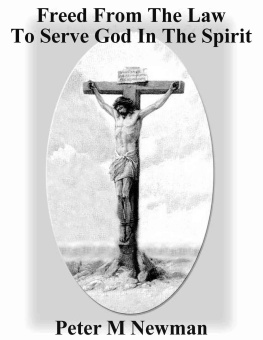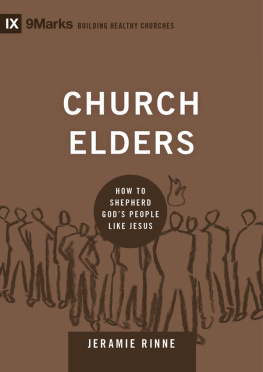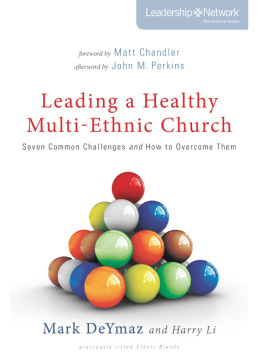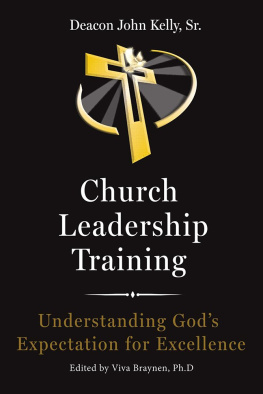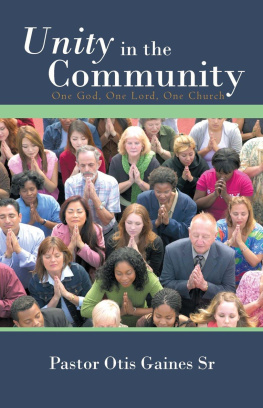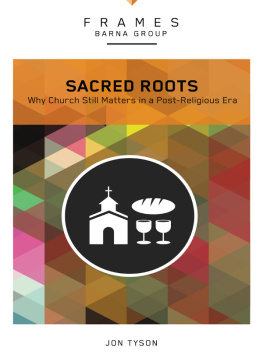While every precaution has been taken in the preparation of this book, the publisher assumes no responsibility for errors or omissions, or for damages resulting from the use of the information contained herein.
A BIBLICAL APPROACH TO CHURCH LEADERSHIP
First edition. July 16, 2019.
Copyright 2019 Peter M Newman.
ISBN: 978-1393455912
Written by Peter M Newman.
10 9 8 7 6 5 4 3 2 1
A Biblical Approach
To Church Leadership
by Peter M Newman
Jesus called them together and said,
You know that the rulers of the Gentiles
lord it over them, and their high officials
exercise authority over them. It is not this
way among you. Instead, whoever wants
to become great among you must be your
servant, and whoever wants to be first
must be your slave just as the Son of Man
did not come to be served, but to serve,
and to give His life as a ransom for many.
Matthew 20:25-28
M ost Christians today accept without question the idea that every church should have a pastor who is the head of their church. However, our modern-day concept of the office of pastor simply did not exist in the first-century church. In the New Testament, the term elder is always used interchangeably with the terms pastor and overseer. All three of these words refer to the same person. Based on the Scriptures, the elders of the church are the overseers who shepherd the local church together. The Greek word for elder is presbuteros, which is found sixty-six times in the New Testament and translated as elder or elders. The Greek word poimen is found eighteen times in the New Testament and always translated as shepherd, except for one-time in Ephesians 4:11 where the King James Version translators used the word pastor. Finally, the Greek word episkopos is normally translated as overseer in the New Testament. However, the translators of the King James Version of 1611 changed the word overseer to bishop to politically conform to the man-made, multi-tiered religious hierarchy of the Church of England in early 1600s.

[N ote: King James the 1st of England had ordered the official translators to conform to (and do nothing to upset) the established church structure, hierarchy, theology, liturgy, practice and rituals of the Church of England when they translated the Bible. For example, in addition to changing the word overseer to bishop, the King James translators also chose political correctness over Bible accuracy when they translated the Greek word baptismos. The word baptismos literally means immersion into a liquid, such as water. However, the Church of England only authorized sprinkling with water and not full immersion into water in its practice of this sacrament; therefore, the King James translators literally made up a new English word, the word baptism, to obscure the Biblical truth that Jesus commanded His disciples to be fully immersed into water, and not just sprinkled with a little water. Thus Pauls statement: We have been buried with Him through baptism into death (Romans 6:3) lost its clarity and power in the King James Version because sprinkling a new Christian with a little water does not adequately depict the divinely powerful Biblical truth that your sinful nature died and was buried when you were saved, which is more accurately portrayed by your bodys full immersion or burial under water when you are baptized].

W henever the apostles established a new church, they normally appointed a plurality of elders (presbuteros) whom they left to take care and watch over the local congregation (Acts 14:23; James 5:14). These elders (presbuteros) shared responsibility together as overseers (episkopos) to shepherd (poimaino) the local flock. For example, in Acts 20:17, we read that Paul sent to Ephesus for the elders (presbuteros) of the church. Paul then told them, Keep watch over yourselves and all the flock over which the Holy Spirit has made you overseers (episkopos) to shepherd (poimaino) the church of God, which He purchased with His own blood (Acts 20:28). And Peter wrote, I exhort the elders (presbuteros) among you: shepherd (poimaino) Gods flock among you, overseeing (episkopeo) not out of compulsion but voluntarily, according to Gods will; not for the money but eagerly (1 Peter 5:1-2). Thus the term elders refers to these brothers spiritual maturity; the term overseers refers to their ministerial function; and the term shepherds refers to their spiritual gifting in the Lord (see Ephesians 4:11). For example, the Bible does not say that if we are sick we should ask the pastor of the church to pray for us; instead, the Bible says that we should ask the elders of the church to pray for us, since the elders (plural) are the pastors (shepherds) of the church (James 5:14). There simply is no church recorded in the New Testament that had our modern-day, man-made concept of a pastor, priest or bishop.

I t was not until the second and third century that church leaders began to wrongly divide the elders role of oversight and shepherding into three separate hierarchal religious offices. They justified this new man-made hierarchy and chain of authority as a means to deal with emerging heresies and divisions in the church. The newly diminished office of elders then became subordinated to the newly created office of the senior pastor in each local church, and the senior pastors in the local churches throughout a region then became subordinated to the newly created office of the regional bishop. Eventually, the regional bishops became subordinated to the archbishops (or cardinals) who, in turn, were subordinated to the Archbishop of Rome, who by the sixth century had become the Pope of the Catholic church. With the introduction of this new top-down clerical hierarchy, church members were told that their spirituality and unity could be clearly observed and validated by their obedience and loyalty to this new religious system. And if anyone dissented and did not submit to this man-made chain of authority, they were considered a heretic and could be excommunicated, which according to the now false church, was tantamount to being condemned to hell. When the Holy Spirit is no longer sovereignly present and directing the church, then inventing a man-made clerical structure and tightening its religious authority over the people in order to keep them under control is the natural and grievous outcome.

M any Christians in our day have recognized that this traditional (yet unBiblical) man-made hierarchy in the institutional church is not only carnal and often prone to abuse; it severely stifles the Holy Spirits leadership and life in the church; it robs the church from having an actively functioning priesthood of spiritually-gifted believers; and it causes many sincere pastors to suffer burn-out and leave the ministry. Consequently, there is a growing realization among Christians that something is vitally missing, and even spiritually wrong with our modern-day system of church leadership, church ministry, and church services. This spiritual concern and dissatisfaction is motivating millions of Christians, who are hungry for the reality (and not just a cardboard form) of true Christian church life, to leave the institutional church and begin meeting together in a much simpler way according to the Scriptural pattern and principles followed by the first-century church. Yet, when these Christians attempt to meet together in New Testament-styled churches, they often encounter one of two problems concerning church leadership. The first kind of problem is an abuse of leadership authority, which grieves and suppresses the Holy Spirit and keeps the saints shackled in carnal subjection, passivity and fear. The second kind of problem is no true spiritual leadership authority at all, which can produce lawlessness and anarchy, and leave an opening for someone who is carnally ambitious to hijack the local church. These problems would be solved if the members of Christs body acted daily on the Biblical truth that they had died with Christ and no longer had a sinful nature. They would then walk in sanctification and be free to fellowship and function together from a secure knowledge of their new born again identity in Jesus Christ and His sovereign grace and wisdom in each of their lives. Let us now look at each of these leadership issues more closely, and then look to the Scriptures for Gods way of Biblical church leadership.



